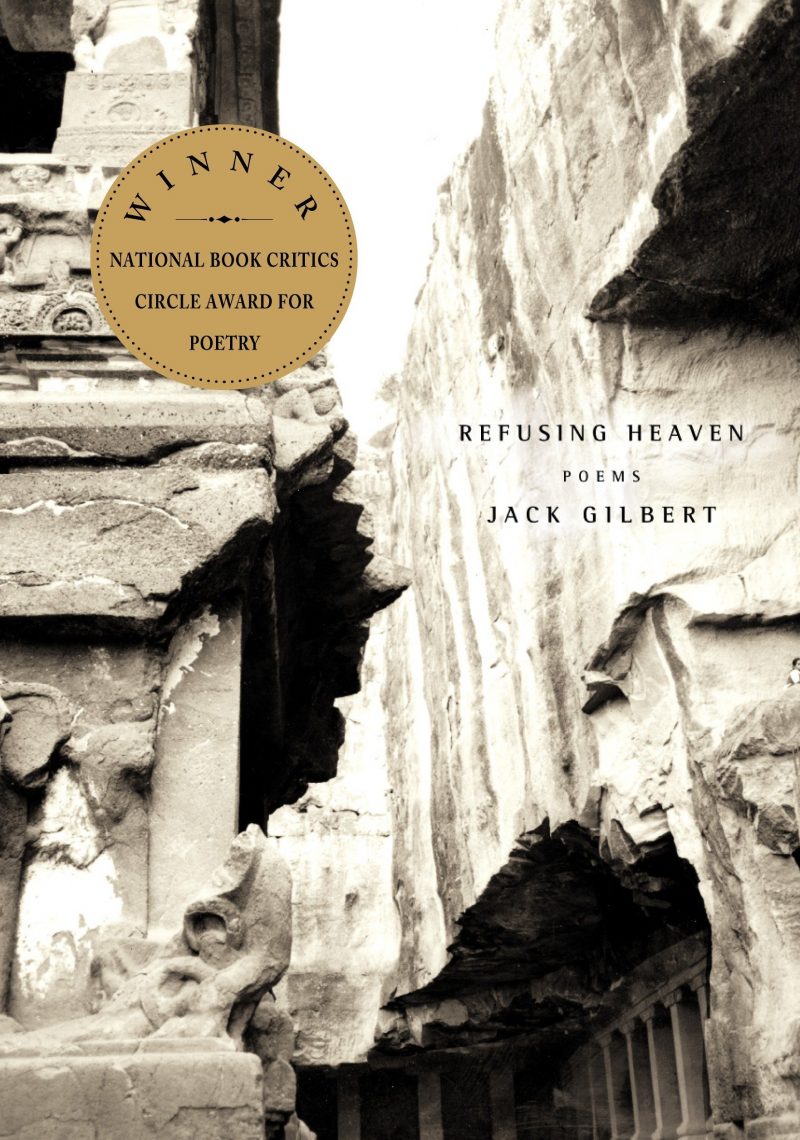Early on, Jack Gilbert chose nonactivity over activity—a strict aversion to scurrying—an anachronism that translates to the casual twenty-first-century reader as pretension or laziness. Gilbert is seventy-nine years old; has published four books; won the Yale Younger Poets Prize in 1962 for Views of Jeopardy; was nominated for a Pulitzer for that book and the next one, Monolithos, which appeared twenty years later; won Guggenheim and NEA fellowships; published a third book ten years later, the great The Great Fires; has mainly lived in places where life consists of cooking, writing, and being in love with one woman or another (those mentioned repeatedly in his poems number three, in five decades of writing).
Those who demand surface complexity to prove a poem’s depth will likely dismiss Gilbert’s work as sentimental, obvious, or thin. Cultural context confuses the reception of work that eschews contemporary received ideas. Gilbert’s aesthetics of exclusion may easily be misread as emptiness, when in fact it’s the result of careful editing of the once full. The weathered look of Gilbert’s poems is not that of a sandblasted picture frame from Anthropologie but of actual wabi.
That’s the first hurdle: Gilbert’s apparent hierophantic pose. The second hurdle is his apparent misogyny. Those who bristle at Gilbert’s poems in which women are a totem creature of mystery and beauty—which seems proof of the author’s antifeminism—miss the point entirely. Is Stevens’s poem about an actual snowman? Is Elliott Smith’s song impenetrable if you’ve never been to the Rose Parade? When did literalism become a moral necessity for poetry? In a 1991 interview Gilbert says of an elegiac poem from his third collection: “It was about grief, not about me.” It isn’t what’s depicted in the poems that matters so much as the emotions that result from reading them. Despite what seemed to Gilbert like intimacy with a few of them, he found the women he “knew” unknowable. With what or whom else was he that intimate? Probably nothing, no one. And so he may write: “We are allowed / women so we can get into bed with the Lord, / however partial and momentary that is.”
Gilbert’s poems are Western or Eastern. In them, pain teaches us. The stuff we see isn’t the real stuff. Sex isn’t the real sex:“We must eat through the wildness of her sweet body already in our bed to reach the body within that body.” Language isn’t the real language: “My joy is the same as 12 Ethiopian goats.”This world is a conduit to the actual, immortal world. That said, to choose to refuse heaven, as the new book suggests, is to prefer the toil to the reward. In Gilbert’s work this results in an aesthetics of waiting—waiting for the real stuff to happen—and in this book, Gilbert prefers to wait infinitely. He votes to keep waiting, knowing the real world’s what’s next, refusing it, instead staying in this world of beauty and suffering, where right living yields “the clarity that does so much damage,” the only pure pleasure, which wrecks us with terrible efficiency.
This book about the imminence and proximity of the next world ends with a poem for Michiko Nogami, the dead wife about whom Gilbert wrote his best poems. In the last line, her right hand is “maybe… a little visible.” In this book, a palinode to the real, the only thing to pray for is seeing.





